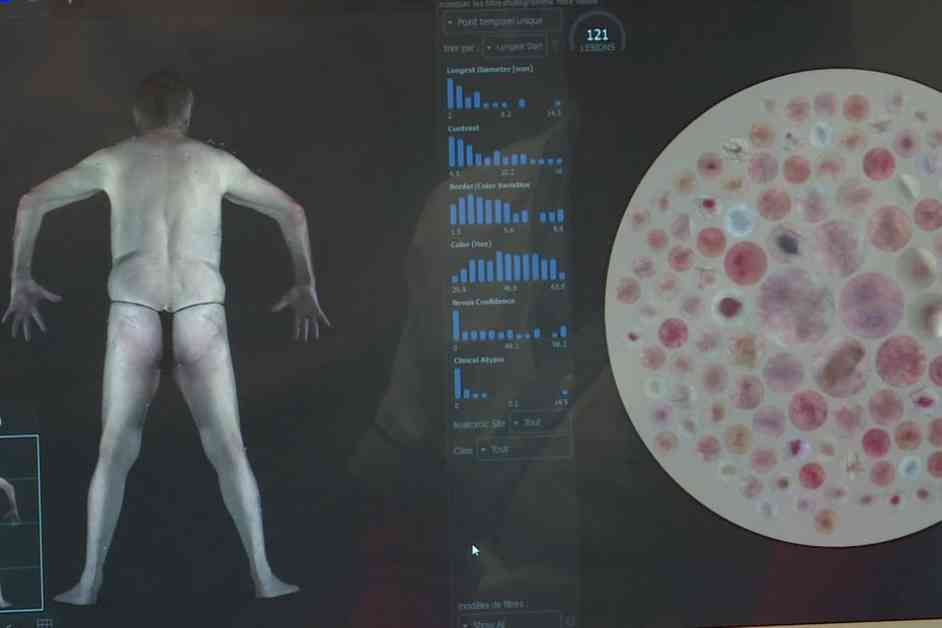Evreux, a town in Eure, has a high-definition dermatological scanner since last October that can detect skin cancers. It is the second city in France after Marseille to have this technology. This innovation is welcomed in one of the French departments with a shortage of dermatologists and in a region particularly affected by melanoma.
The machine, measuring 3 meters high and 5 meters wide, called «Vectra 360,» can photograph a patient’s body in a single shot, thanks to its 92 high-definition lenses. It can detect any suspicious skin lesions. This innovative technology is highlighted during this week dedicated to skin cancer screening, taking place this year from June 10 to 16.
France-Dermatology, located in Evreux, is behind the development of this innovative system. Two cities in France have these high-performance scanners: Marseille in Provence Alpes Côte d’Azur, and since last October, Evreux in Eure.
«It’s like a giant camera that photographs the patient’s body. I then see their 3D body map on my computer, along with all the lesions on their body very precisely. The dermatologist enters criteria into the computer, so I can photograph certain lesions more than others. These lesions are then categorized based on their type,» explains Emilie Guny, the assistant dermatologist in charge. On that day, she was photographing the body of a 70-year-old man with no specific history. The scanner creates a map of visible skin lesions and moles that the practitioner can study with the help of artificial intelligence. The AI can distinguish between a lesion and any other skin damage and guide the practitioner on important points to check.
«The artificial intelligence indicates the most suspicious and dangerous lesions, while the dermatologist has access to all the lesions and provides the final diagnosis,» says Emilie Guny, the assistant dermatologist at the France-Dermatology Center in Evreux.
The France-Dermatology center in Evreux works with two dermatologists who will connect to the assistant’s computer and carefully examine the body map. «The dermatologist can observe the patient in detail,» continues the assistant. The specialists are not on-site but will provide a report to the patient quickly.
The patient is pleased with the speed of the examination. «I had never had this type of examination because you have to wait for I don’t know how long to see a dermatologist, and now it’s more than complete. I see on the screen all the irregularities on my skin, which is both reassuring and worrying. There were two that worried me a little, but now we see them better, it’s well developed, thanks to today’s technology. It’s fabulous.»
This highly efficient machine has several dermatological features, but the main one is the early detection of skin cancers, namely melanomas and carcinomas.
Melanoma alone is responsible for 2,000 deaths in France each year. This skin tumor often looks like a mole with asymmetrical contours, various colors, and growth or change. Early detection is essential to stop the tumor’s progression in time, but the shortage of dermatologists in France, particularly in this department, makes it more challenging. According to the National Agency for Territorial Cohesion, Eure is the least equipped Norman department with 1.5 practitioners per 100,000 inhabitants, compared to 4.2 in Calvados, 2.8 in Manche, 2.1 in Orne, and 3.5 in Seine-Maritime. Normandy also has a 23% higher mortality rate in women from melanoma compared to metropolitan France. Calvados, Seine-Maritime, and Manche have excess mortality rates of 21%, 28%, and 31%, respectively, compared to the national average.
The French National Syndicate of Dermatologists and Venereologists has been organizing a week of information and skin cancer screening for 27 years. «A week to save your skin, a lifetime to take care of it.»
Every summer, dermatologists emphasize essential tips to avoid the consequences of sun exposure: avoid exposure between 12 p.m. and 4 p.m. when UV rays are the most intense, apply high-protection sunscreen every two hours, wear dark clothing, sunglasses, and a hat, and never expose a child under three years old. They also stress prevention and self-examination, monitoring the evolution of moles and skin lesions.
100,000 skin cancers are diagnosed each year in France, and their incidence has tripled since 1980. Anyone can check their skin’s condition at this Evreux center, even without a medical prescription. The consultation costs 8 euros and will only be reimbursed if the patient has a family or personal history or has more than 50 moles on their body.




















